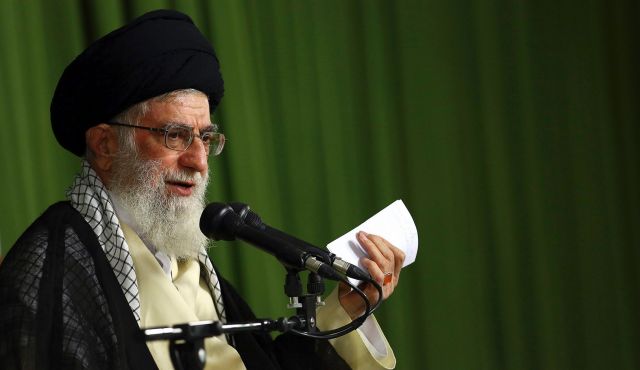Obama sent letter to Iran’s Khamenei; Israel kept in the dark
In secret letter, U.S. president says cooperation in fight against ISIS hinges on reaching a nuclear deal between Iran and world powers.
By Barak Ravid/Nov. 6, 2014/Haaretz
U.S. President Barack Obama sent a secret letter to Iran’s supreme leader, Ayatollah Ali Khamenei, last month, in which he wrote that the two nations have shared interests in fighting the Islamic State group in Iraq and Syria, but that any cooperation between Tehran and Washington on this issue would hinge upon reaching an agreement over Iran’s nuclear program by the November 24 deadline, the Wall Street Journal reported on Thursday.
The White House did not inform either Israel or America’s Gulf State allies, like Saudi Arabia and the United Arab Emirates, about the letter, which was sent in mid-October, according to the report.
The White House refused to either confirm or deny the report. At a daily briefing for reporters, White House spokesman Josh Earnest said he cannot discuss private correspondence between the president and other world leaders.
But the Wall Street Journal reported that senior administration officials didn’t deny the letter’s existence when asked about it by foreign diplomats over the past few days. It’s possible the diplomats in question were members of the high-level Israeli delegation that went to Washington last week for talks with the administration over Iran’s nuclear program. The delegation was headed by National Security Advisor Joseph Cohen, and the visit included a private meeting between Cohen and his American counterpart, Susan Rice.
Earnest said that senior American and Iranian officials have discussed the battle against the Islamic State, also known as ISIS or ISIL, on the sidelines of the nuclear talks in recent weeks. But he stressed that the negotiations with Iran remain focused on its nuclear program.
The Prime Minister’s Office declined to comment on the report. But if Israel really wasn’t informed about the letter to Khamenei, and learned of it only from the Wall Street Journal, that is liable to deepen the already severe lack of trust between Jerusalem and Washington on an issue –Iran – that is critical to their relationship.
Iran is negotiating with a six-nation group comprised of the United States, Britain, France, Germany, China and Russia. Israel’s fear is that the America and the other Western powers will soften their positions as the November 24 deadline approaches out of a desire to reach an agreement.
Friday morning, Strategic Affairs and Intelligence Minister Yuval Steinitz will arrive in Paris for meetings with Foreign Minister Laurent Fabius in an effort to coordinate positions with Paris on the Iranian issue.
Over the past few weeks, Israeli officials have discerned a retreat in the West’s positions with regard to the number of centrifuges Iran would be allowed to keep under a final agreement. Iran, they say, hasn’t budged, but the West has gradually upped the number of centrifuges it would be willing to live with.
The report on Obama’s letter to Khamenei, his fourth since 2009, was published just days before a planned tripartite summit at which U.S. Secretary of State John Kerry, Iranian Foreign Minister Mohammad Javad Zarif and the European Union’s chief nuclear negotiator, Catherine Ashton, will strive for a breakthrough that would enable a permanent agreement on Iran’s nuclear program by the official deadline. The summit will take place on Sunday and Monday in Muscat, the capital of Oman.
Obama, who has made the effort to reach a nuclear deal with Iran a key aim of his second-term foreign policy, discussed the issue at a press conference on Wednesday. He said the United States and the other powers had offered Tehran a “framework” for a deal that would enable Iran “to meet their peaceful energy needs.”
“And if in fact what their leadership says, that they don’t want to develop a nuclear weapon, if that is in fact true, then they’ve got an avenue here to provide that assurance to the world community and in a progressive, step by step, verifiable way, allow them to get out from under sanctions so that they can reenter as full-fledged members of the international community,” he added.
Obama said he preferred a diplomatic agreement with Iran to all the alternatives, including the military option. Nevertheless, he insisted, he would prefer no deal at all to a bad deal.
He also said there was a serious question as to whether Iran would be capable of accepting the West’s offer for a nuclear deal.




















